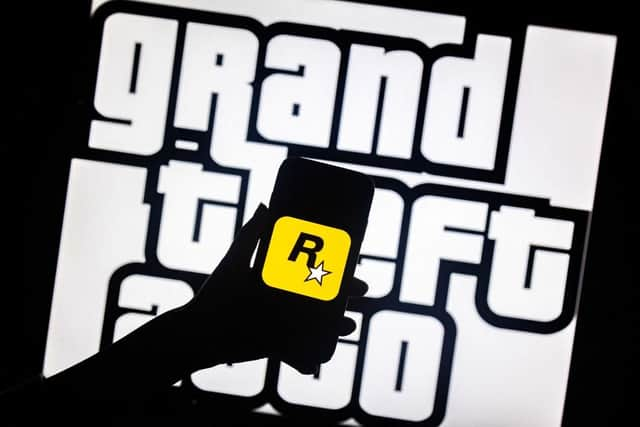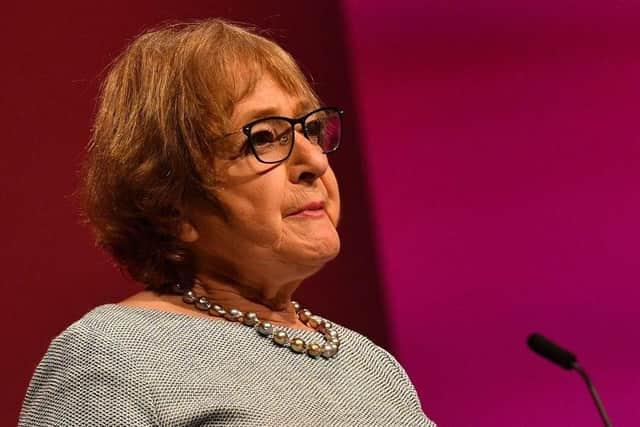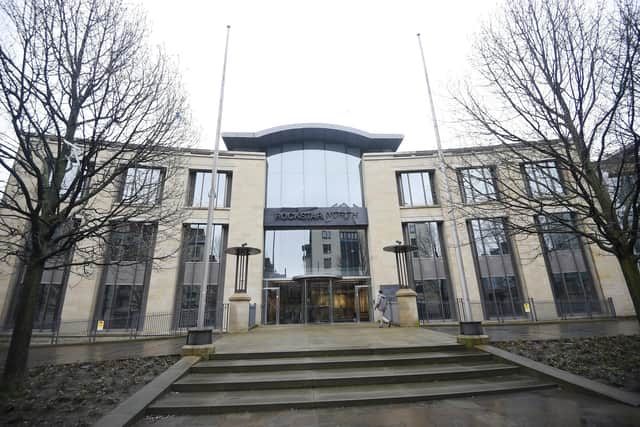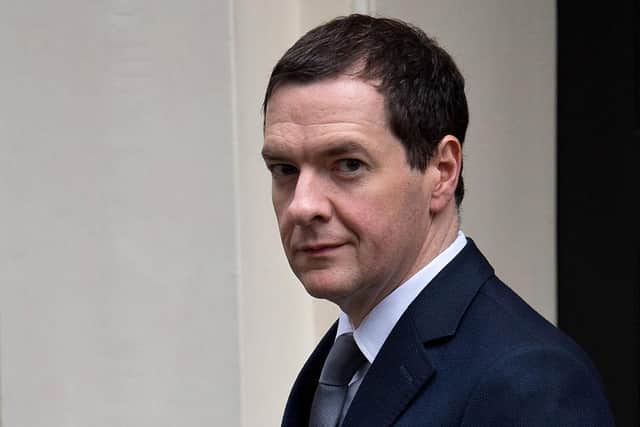Exclusive:Rockstar North: Grand Theft Auto producers claim over a third of a billion pounds in tax relief, prompting calls for Treasury overhaul
The Scottish firm behind one of the world’s most profitable entertainment franchises has claimed more than a third of a billion pounds in tax relief over the past decade, sparking intense criticism of a tax system described as “broken”.
The vast sums claimed by Rockstar North, the developers behind the wildly successful Grand Theft Auto (GTA) video game series, has invited scrutiny of whether the Edinburgh firm and its ultimate owners, a US multinational that counts Saudi Arabia’s sovereign wealth fund among its biggest shareholders, have disproportionately benefited from a Treasury initiative set up to support a British games industry primarily comprised of small and medium-sized firms.
Advertisement
Hide AdAdvertisement
Hide AdRockstar, long feted as one of the world’s foremost game producers, has enjoyed critical and commercial acclaim over the past two decades thanks to a succession of ground-breaking open world crime titles. Since the initial release of the last instalment in the GTA series, it has generated profits of £448 million on a total turnover exceeding £2.1 billion. It has not paid any UK corporation tax since being accredited for the government tax break in 2015.
An investigation by The Scotsman can reveal in that time, Rockstar has claimed £360.3m via the Video Games Tax Relief (VGTR) scheme – the equivalent of more than five times its £69m operating profits over the same period. Since VGTR’s rollout, Rockstar has also paid dividends worth over £185m via another UK subsidiary entity to its US parent firm, Take-Two Interactive.
New York-based Take-Two, one of the world’s largest independent game publishers, has also generated extraordinary sums of money, with total sales exceeding £21.7bn and profits of £743m between 2014 and 2023. Such a performance has sent its share price soaring and attracted major investors, including the Saudi Public Investment Fund, and three of the world’s leading asset managers: Blackrock, Vanguard, and Capital International Investors. Cumulatively, the four entities own nearly 30 per cent of Take-Two’s common stock.
Dame Margaret Hodge MP, chair of the all-party parliamentary group on anti-corruption and responsible tax, questioned why a foreign-based multinational could claim such a “huge amount” of tax relief meant to incentivise smaller British businesses. She urged the Treasury to scrutinise a system she said was “costing the taxpayer a fortune”.
With industry experts predicting that Rockstar’s next GTA game will generate sales of up to £1.6bn in its first year of release, tax campaigners stressed it was “highly unlikely” that such a “fantastically profitable” series required hundreds of millions of pounds of public subsidy, and said the company’s use of VGTR raised wider questions around the design of the entire government tax regime.


There is no suggestion of illegality concerning Rockstar’s use of VGTR. The company said it had more than 1,500 employees in the UK, who “contribute substantially” to economic activity, including payments by the firm and its staff of “significant personal income taxes” and National Insurance contributions. It said VGTR had been “instrumental” in fostering such career opportunities.
The Treasury said it did not comment on the tax affairs of individual companies, stressing the government kept the tax system under review.
Rockstar alone has claimed almost 35 per cent of the games industry’s total tax relief
When the VGTR scheme was introduced by then chancellor George Osborne a decade ago, he pointed out that 95 per cent of UK game developers were SMEs. “This is a key industry of the future and I want Britain to be one of its biggest centres,” he said. “This relief is one of the most generous in the world and will help them to grow, creating new jobs for hard-working people.”


Advertisement
Hide AdAdvertisement
Hide AdCompanies which qualify for VGTR are able to claim back 20 per cent of their production costs during a game’s development. If the production company is loss-making, it can claim a cash credit from HM Revenue and Customs (HMRC). Some small Scottish development studios had warned that although the corporation tax breaks would attract inward investment, the “biggest winners” would be large multinational publishers and developers.
The scheme was ultimately approved following an investigation by the European Commission, which concluded it would be focused on “a small number of distinctive, culturally British games which have increasing difficulties to find private financing”.
Since 2015/16, there have been more than 2,000 VGTR claims, many of which have helped small and micro developers to prosper. TIGA, the game industry trade association, has hailed it as a game changer that has helped to boost employment in the sector by an annual average of 9 per cent, and bolster innovation and investment so the UK can compete on a more level playing field with global competitors such as France and Canada. Take-Two and Rockstar pointed to an analysis by Games Investor Consulting, which claimed VGTR has triggered over £2bn in additional UK economic growth since its introduction.
But Rockstar alone has claimed almost 35 per cent of the £819.4m paid out via VGTR between 2015/16 and 2021/22. In some years, it claimed almost half the UK total. The sums involved have also ramped up significantly in recent years. Between April 2021 and March last year, a period in which its turnover exceeded £1bn, the company claimed £155.3m via VGTR as its teams of artists, designers, and programmers worked on the highly anticipated eighth main game in the GTA series, due to be released next year.


Claire Ralph, director of Taxwatch, an investigative think-tank that has closely scrutinised Rockstar’s use of VGTR in previous years, said it had concerns about the “very large proportion” of the relief claimed by the company. She described the recent dividends paid to Take-Two as “galling”, adding: “For a tax relief that was designed to support micro and small businesses that were at risk of not being commercially viable to attract financing, the relief has mushroomed into a huge subsidy for games that are multi-billion dollar franchises.”
The tax credit claims of Rockstar alone dwarf the sums conceived during the inception of VGTR. When it was rolled out in 2014, the UK government estimated it would provide around £35m of support per year to the entire UK games sector. However, the average annual claim of Rockstar alone since VGTR’s introduction stands at more than £45m.
Ms Ralph said: “Given the numbers receiving final certification and hence eligible to claim the valuable relief each year, the tax relief appears to be far more concentrated on a few large game productions, because no overall cap applies to the amount of relief available per year or per game. Taxwatch is particularly concerned that a single game producer can secure such a large amount of relief, which wasn’t the original stated intention of the government when the relief originally came in.”
Dan Neidle, a veteran tax lawyer, and the founder of Tax Policy Associates, said: “I am deeply unconvinced these reliefs represent good value for money. It’s unpalatable to see so much being handed out to a company that doesn’t need them. And I can’t recall any relief where a third of the benefit went to just one company. But that’s not Rockstar’s fault – it’s inherent in the design of the relief.”
Advertisement
Hide AdAdvertisement
Hide AdDame Margaret, the veteran Labour MP who served as culture minister under Gordon Brown’s government, said: “Our tax relief system is broken and costing the taxpayer a fortune. Why can a foreign-based multinational claim such a huge amount of a video game tax relief meant to incentivize smaller British businesses? The Treasury must scrutinise these tax reliefs to ensure they are serving their intended purpose, that we are getting value for money and that they are not being abused for egregious tax avoidance.”
First Dundee, then the world


The genesis of Rockstar’s remarkable success can be traced back 37 years to the formation of DMA Design. The fledgling studio was founded in modest offices above a clothes shop in Dundee’s Nethergate by Dave Jones, a former apprentice engineer at the city’s Timex factory. Its first hit, Lemmings, inspired Mr Jones and his small team to push the envelope. They developed a game that gave players the freedom to assume the role of a police officer in a teeming 2D cityscape. It was only when they struck upon the idea of letting the player run riot as a criminal that the title, then known as Race ‘n’ Chase, took off.
Having signed a £3.4m deal with an offshoot of music publishers BMG, the game, rechristened as Grand Theft Auto, proved a success upon its 1997 release. Two years later, the firm was acquired by Take-Two and later renamed as Rockstar North, setting in motion a quarter century-long ascent that would see the company become a world-leading developer.
According to Take-Two’s filings with the US Securities and Exchange Commission (SEC), the GTA series has sold around 415 million units worldwide, with its most recent instalment, GTA V, generating estimated revenues of £6.1bn. The Scottish studio was also part of the global team that worked on Red Dead Redemption 2, a sprawling western epic that has sold over 60 million copies since 2018.
One game industry source said Rockstar was effectively contracted to produce the GTA games, with Take-Two retaining the all valuable intellectual property rights. Notes in Rockstar’s latest accounts point out that its turnover in 2022/23 of £506m arose “from the provision of research and development functions to its parent company”, with 100 per cent of the sum attributable to the US market.
Even so, the huge sums brought in by GTA have helped some of Rockstar’s key figures become wealthy in their own right. A glimpse of the money involved emerged six years ago in a US court case in which Leslie Benzies, Rockstar’s Aberdeen-born former president, sued Take-Two over £119m in unpaid royalties. The litigation ended in 2019 with a confidential settlement.
One of the Edinburgh company’s current directors, Daniel Emerson, is not paid by Rockstar, but receives significant remuneration from Take-Two, where he is the firm’s executive vice-president and chief legal officer. Last year, his total compensation package was more than £6.4m, including more than £5.7m in stock awards, according to SEC filings.
The 52 year-old also holds 132,296 shares of Take-Two’s common stock, a holding worth around £20.7m, based on the share price as of February 13. Take-Two and Rockstar said none of Mr Emerson’s compensation was included in the VGTR claims.
‘This case calls into question the design of the whole regime’
Advertisement
Hide AdAdvertisement
Hide AdIt is in the context of such dizzying financial success that Rockstar’s use of the tax relief is considered especially contentious. In the two years before it gained the final certification from the UK Department for Culture, Media, and Sport (DCMS) to begin using the scheme, it generated modest profits totalling nearly £3.4m. But after it was notified in October 2015 that GTA V met the requirements of the Cultural Test (Video Games) Regulations 2014 to be classified as a British video game – a process overseen by the British Film Institute – Rockstar’s profits rocketed to £36.9m in 2015/16. Even those results are overshadowed by the financial successes of recent years. In 2021/22, Rockstar posted record profits of £93m after receiving £79.8m in VGTR. Its 2022/23 accounts show a profit of £65.5m, with £75.4m claimed in VGTR.
Those claims outstrip those of the few other game development firms in Scotland working on major, big budget titles. Build A Rocket Boy, an Edinburgh studio set up by Mr Benzies after he left Rockstar, claimed £5.4m in 2022, and £4.4m the previous year, according to its accounts. However, Rockstar’s expenditure is significantly higher – its most recent accounts show an annual wage and salary bill of £316.3m compared to £14.6m at Mr Benzies’ firm.
One industry figure with experience of the tax relief system in Scotland suggested that without VGTR, “maybe the firm’s commercial success would have been exactly the same”, but that questions would have arisen over whether it would have remained headquartered in Edinburgh. “The answer might be no,” they reasoned.
But Alan Lewis, Take-Two’s vice president of corporate communications and public affairs, told The Scotsman: “Rockstar Games is proud to employ over 1,500 – and growing – highly talented people in the UK and to contribute substantially to UK economic activity over many years, including the payment by the company and those employees of significant personal income taxes and National Insurance contributions in the UK. VGTR has been instrumental in fostering these career opportunities, helping to ensure that the UK remains a leader in culture and technology for years to come.”
The VGTR tax incentives claimed by Rockstar do not take into account millions of pounds worth of other grants received by the firm over the past decade. They include more than £3.5m in research and development expenditure credits, another UK tax relief scheme, and over £2.5m in research and development grants from Scottish Enterprise.
But it is the issue of the VGTR claims that has led to questions of how best the scheme is fulfilling its aims of helping smaller and medium-sized developers. The most recent HMRC data shows that while 49 per cent of claims were for £50,000 or less in 2021/22, they accounted for just 5 per cent of the total relief; claims of more than half a million pounds made up 78 per cent of the total relief.
Robert Palmer, executive director of the campaign group Tax Justice UK, said: “GTA is one of the most successful games in the world – it’s a testament to the creativity of its Scotland-based creators. However, it’s highly unlikely that such a fantastically profitable product needs hundreds of millions of pounds of public subsidy.
“This case calls into question the design of the whole video game tax reliefs regime. In general, the government has very little oversight of whether or not tax breaks are value for money. When public services are crying out for more investment, politicians need to do a better job of targeting public money.”
Advertisement
Hide AdAdvertisement
Hide AdMr Neidle said given the generosity of VGTR, he expected there was “widespread tax avoidance”. He said he had never seen any value-for-money analysis of the VGTR scheme, and there was no “easy fix” for its failings. “The answer is to not create these kinds of relief at all,” he reasoned.
Such doubts are tied to wider questions about the sprawling system of UK tax reliefs. Last year, MPs on the Treasury committee called for a “systematic review” of the 1,180 schemes in existence, and warned “inadequate” scrutiny had led to abuse and fraud. The total cost of the reliefs is unknown, but an analysis by HMRC of just 104 of them put the cost to the public purse at £204bn.
The Treasury said HMRC decided which reliefs to evaluate against several criteria, including the annual cost associated with a relief, and whether the relief’s design had recently changed substantially. It said all tax reliefs were subject to regular assessment against the evaluation criteria.
A homegrown Scottish success story
One source at Rockstar said the issue of its claims was ultimately for the UK government to defend. “We are using it like any other video game development company,” they explained. “If you’re asking whether we should be using it, you should be asking whether the scheme is set up in the right way.” The source also pointed out the firm had invested significantly in its Scottish development base, a development that was “made easier” thanks to the tax credits.
Indeed, in a sign of how increasingly technically complex games require longer development timelines and more staff, the number of employees on Rockstar’s books shot up from 356 in 2013/14 to a record high of 1,554 in 2022/23. However, that increase is partly due to staff from other Take-Two subsidiaries being transferred to the company.
It has also consolidated its position in the Scottish capital. During the pandemic, a time when the commercial property sector was facing an uncertain future, an associated company, Take-Two Interactive Software Europe Ltd, spent £31m to purchase Barclay House, an imposing 75,000 square foot office building opposite the Scottish Parliament. The Holyrood Road building once served as The Scotsman’s offices, but is now the wholly-owned headquarters of Rockstar, or as it is now known by Take-Two, Rockstar Games UK. Take-Two also purchased the neighbouring Holyrood Park House offices for around £18.5m, where the firm rents office space to organisations including Citibank.
Rockstar’s investments, coupled with the ongoing success of GTA, has understandably led to the firm being hailed as a home-grown Scottish success story and the flagbearer of the nation’s vibrant games industry. A new national strategy has been approved by ministers to further grow the sector, which employs around 6,400 people, and is worth around £350m to the Scottish economy. Rockstar has featured in the UK government’s international strategy to drive global growth for the creative industries, and its representatives met last year with business secretary Kemi Badenoch at a roundtable event to discuss challenges in the sector.
Since 2022, one of Rockstar’s directors, Rowan Hajaj, has had at least two meetings with culture secretary Angus Robertson. Summaries of one meeting note the discussions included “the benefits of operating in Scotland, including talent and financial support”. A briefing prepared for Mr Robertson for the meeting, which took place in New York in April last year, noted “Team Scotland is keen to work with Rockstar to grow its facilities in Scotland”, adding: “Are Rockstar aware of/can we make introductions for them to our Techscaler initiative, which is a major piece of infrastructure designed to support the creation of more tech/gaming start-ups in Scotland, and to help them to grow to scale?”
Advertisement
Hide AdAdvertisement
Hide AdHowever, a government spokesman said the purpose of proposing the introduction was to bring Techscaler to Rockstar’s attention, and to seek its support for the initiative. It said the firm had received no financial support from the programme. Asked whether it was appropriate that a firm namechecked as an example of a high-profile scale-up in the government’s national strategy for economic transformation claimed hundreds of millions of pounds in tax relief, the government declined to comment, pointing out VGTR was reserved to the UK government.
‘They will make a ton of money’
Come 2025, Take-Two and Rockstar are expected to rewrite the record books again when GTA VI is finally released. A trailer for the game was unveiled in December, depicting Vice City, Rockstar’s fictional version of the US city of Miami. It has since been viewed 174 million times.
Last week, Take-Two forecast sales of around £5.5bn in the coming fiscal year, with CEO Strauss Zelnick stating the firm was “seeking perfection” with GTA VI. “We stop well short of making predictions about how the title will do, but clearly anticipation is running very, very high,” he said.
Joost van Dreunen, an adjunct assistant professor at New York University’s Stern School of Business, and the author of ‘One Up: Creativity, Competition, and the Global Business of Video Games’, said: “Take-Two emphasises quality of production over shareholder interests, which has historically resulted in outsized financial returns. Its management will delay title releases and update its forecasts accordingly, regardless of what investors may say. It has proven itself to large institutional investors and offers a less risky investment than some rival game publishers.”
Dmitri Williams, a gaming business expert and professor at the University of Southern California’s Annenberg School for Communication, said: “They will make a ton of money, almost certainly more than in previous iterations. Their products have been consistently high quality and have accrued massive brand loyalty over time. There is pent-up demand for GTA content.”
Mr Williams said he “would not be surprised” if GTA VI made between $1.5bn and $2bn “or more” in its first year, with a steady, but smaller sum of revenues generated annually for the next decade, thanks to in-game purchases and downloadable content that will require Rockstar to continually invest and support the title.
There are also changes afoot to the tax relief system, which mean the claims from Rockstar and other developers could, in theory, increase further. The VGTR is being gradually replaced with a new form of tax relief known as video games expenditure credit (VGEC). The credits will be calculated directly from a production or game’s qualifying expenditure, instead of being an adjustment to the company’s taxable profit, and bring a headline 34 per cent credit rate – roughly equivalent to a rate increase of 0.5 per cent under the previous tax reliefs. Nigel Huddleston, financial secretary to the Treasury, who namechecked GTA in a Treasury press release announcing the changes, said the system was “more generous”.
That headline rate of 34 per cent exceeds even what TIGA had been pushing for ahead of the last budget. And like VGTR, the new scheme has no caps for claims by any one company or production. In Ms Ralph’s view, that is an oversight that will hit the public purse.
Advertisement
Hide AdAdvertisement
Hide Ad“The UK government had the choice when they were designing VGEC to insert new safeguards into the scheme to cap total relief claimable in relation to a qualifying game, or to focus the relief at a narrower range of games that have more British hallmarks,” she said. “The cost to the UK taxpayer is expected to rise yet further, offering poor value for money. It is not clear why the Chancellor decided to make the regime yet more generous when there was abundant evidence that it was poorly delivering against the stated aims of the previous scheme.”
Comments
Want to join the conversation? Please or to comment on this article.